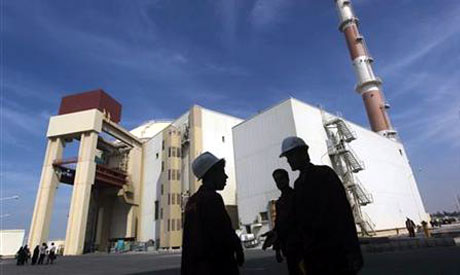
Bushehr nuclear power plant, South Tehran, October 2010 (Photo: Reuters)
Senior UN nuclear watchdog officials could visit Iran for talks, a day after an Iranian envoy suggested Tehran would be ready to discuss international concerns and remove "ambiguities" about its atomic activities.
Iran's latest overture to the Vienna-based UN agency, which has long urged Tehran to address disputes about its nuclear agenda, coincides with a sharpening of international sanctions imposed on the Islamic Republic over its nuclear work. The Islamic Republic says it is enriching uranium solely for peaceful purposes but its foes suspect this has military aims.
"We're working on a possible visit," Gill Tudor, spokeswoman for the UN International Atomic Energy Agency (IAEA), said in an email response to a question. She gave no further details.
Western fears that Iran is seeking to develop atomic bomb capability were reinforced by an 8 November IAEA report that said Tehran appeared to have worked on designing a nuclear weapon. Suspicions have been stoked by Iranian secrecy and lack of full cooperation with inspectors from the IAEA, whose job is to verify that countries' nuclear activities are peaceful.
Iran says its nuclear work is a peaceful bid to generate electricity so that it can export more of its oil and gas. Iran's ambassador to the IAEA on Tuesday told Reuters that Tehran had renewed its invitation - first issued in October - for a senior agency team to travel to the Islamic Republic.
Ali Asghar Soltanieh said the purpose would be "to work to remove any ambiguities with the aim of resolving the issues and to conclude and stop this endless process."
Iran initially invited Herman Nackaerts, IAEA deputy director general and head of nuclear safeguards inspections worldwide, in October. But Iran's angry reaction to the agency report the following month threw those plans into doubt.
Western diplomats tend to see such invitations as attempts by Iran, a major oil producer, to buy time and ease international pressure without heeding UN demands to curb activity that could be put to making atomic bombs and be transparent about its programme to ease misgivings about it.
Previous visits to Iran by senior IAEA officials have failed to make significant progress towards resolving the long-running row over Iran's nuclear programme, a dispute which has the potential to ignite a wider conflict in the Middle East.
"Our overriding perspective is still one of scepticism," one Vienna-based diplomat said about Iran's invitation. "If Iran does choose to cooperate fully with the IAEA I think we would all welcome that. That is what we have been pushing for."
But, the diplomat added: "They have a long history of not doing so and offering invitations and holding meetings that fall far short of full and transparent cooperation." IAEA inspectors monitor Iran's declared nuclear sites but their movements are otherwise restricted.
IAEA Director General Yukiya Amano has made clear that any new visit to Tehran must address the agency's growing concerns about potential military dimensions to the nuclear programme.
Asked whether Iran would be willing to discuss such issues, Soltanieh said on Tuesday: "We are going to discuss any questions and to work towards removing the ambiguities and resolving the issue."
Soltanieh has used similar language in the past in support of further talks, with no substantive outcome.
Western countries seized on last month's IAEA report, which said secret weapons-relevant research may be continuing in Iran, to ratchet up economic sanctions on the Islamic Republic.
In the latest such move, the US Treasury Department said on Tuesday it was expanding sanctions to include 10 "shipping and front companies and one individual based in Malta" affiliated with the Islamic Republic of Iran Shipping Lines.
In Rome, diplomats from the United States, the European Union and other allies agreed on Tuesday to step up pressure on Iran to force it to resume talks over its nuclear programme. The diplomats from the so-called "group of like-minded nations" met to discuss further sanctions against Iran, which could include an EU oil embargo.
Short link: